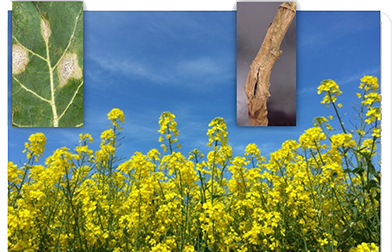Durability of Oilseed Rape Resistance
Henrik Stotz joined the University of Hertfordshire as a EU Marie Curie FP7 Fellow in 2013. He is a Reader in Crop Protection and the focus of his research team is on extracellular pathogens of arable crops with emphasis on Brassica host species.
His team uses a combination of molecular genetics, functional genomics, biochemistry, cellular biology and bioinformatics to better understand crop-pathogen interactions. Important UK pathogens of oilseed rape (Brassica napus) are studied, including the globally important Leptosphaeria maculans and Pyrenopeziza brassicae, which cause phoma stem canker and light leaf spot, respectively. Yield losses to light leaf spot have recently exceeded other oilseed rape diseases in the UK. Mechanisms of disease susceptibility and resistance are under investigation.

[Fig 1 left] Oilseed rape, the second largest oilseed crop in the world, at the flowering stage (Centre) is threatened by diseases like phoma stem canker caused by Leptosphaeria maculans. This fungal pathogen causes visual leaf spot (upper left) and canker symptoms (upper right) but otherwise colonises the host asymptomatically.
A resistance cluster on chromosome A07 containing four R genes against L. maculans is shown [Fig 2 below] with automatically annotated gene models that differ between two cultivars of the crop. This work explores possible contributions of leucine-rich repeat receptors to resistance against three globally important oilseed rape pathogens.
Funded projects
Funded international collaborations exist with teams in the UK and India (BB/R019819/1 from 2018 to 2021) and Japan (JSPS BRIDGE Fellowship in 2017 and Royal Society IEC\R3\183000 from 2019 to 2021), who share interests in economically important fungal pathogens, e.g. Sclerotinia sclerotiorum, Alternaria brassicae and Fusarium oxysporum.
The team has contributed to the BBSRC ERA/CAPS project on Mechanistic Analysis of Quantitative disease resistance in Brassicas by Associative Transcriptomics from 2015 to 2018.
A KTN BBSRC CASE PhD studentship (2015-2019) enabled research on temperature sensitivity of brassica resistance against L. maculans. The topic of an MSc studentship (2018-2019) was on oilseed rape leaf wax characteristics and their influence on resistance against P. brassicae. The team works with Plant Breeders (Elsoms, LS Plant Breeding, KWS) and Agricultural Trusts (Chadacre Agricultural Trust, Morley Agricultural Trust, Felix Cobbold Trust) on funded projects.
Memberships
Fellow of the Higher Education Academy and a member of the Royal Society of Biology and the British Society for Plant Pathology.
Team members
Haitham Sayed (Research Fellow since 2019)
Current students
I am a biochemistry post-graduate research assistant who first started to work at the University of Hertfordshire in 2016 within the crop protection group, focusing on phoma stem canker and light leaf spot, which are both diseases of oilseed crops. In 2019,
I moved onto completing a Masters by Research degree in the aim to discover whether the waxy cuticle layer of oilseed leaves directly influence the infiltration of Pyrenopeziza brassicae (the causal agent of light leaf spot) as part of plant-pathogen interactions.
I achieved my MSc in Plant Pathology in the summer of 2020 and am now part of a team researching the Brassica pathogens Sclerotinia and Alternaria.
PhD student with LS Plant Breeding
I am a PhD dual award student with Western Sydney University and the University of Hertfordshire.
For my thesis I am investigating the molecular mechanisms that regulate the switch from an initial symptomless phase to a destructive disease phase in hemibiotrophic pathogens, Phytophthora medicaginis and Leptosphaeria maculans, during colonisation of agriculturally important hosts chickpea and canola, respectively.
This work aims to improve our understanding of pathogen biology but also inform future work to improve disease resistance to agriculturally important pathogens.



